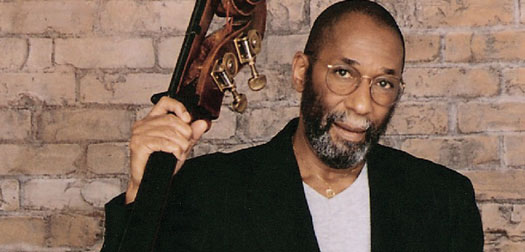|
|
|
|
 |
||
|
|
|
Right. Definitely. But it's not really the color‚ the sound‚ or the thread…
That's right. But I like listening to Jimmy Smith‚ Shirley Scott. I mean there are some wonderful organ players who play really well down there. When I played with them they had more fun because they weren't responsible for everything.Yeah‚ they could open it up a little more. Well‚ in terms of sound you've always stuck with the upright. That's kind of your voice even though you've played quite a bit of electric bass. I talked to McCoy Tyner about that as well and he had the same feeling about the acoustic piano; it's his voice. And you always go back to the upright.
Well‚ there are so many who played it well and to be competitive on two instruments is more time than I have in a day. So I decided the upright was probably my best chance at getting some music going. It's different. It's not the same you know? And electric players understand that‚ critics don't.
Since you've done so much playing‚ I think I heard you say something about how you get out of bed and give yourself a round of applause but there's still more music to make and something new to try. What are some of the concepts you're working on right now?
Oh… I'm still trying to figure out a way to grab the horn player's attention without screaming at him musically. And how can I set a phrase up so he can hear what's coming before I play it? That's still my goal.
[laughs] That seems like a real simple yet very complicated concept.
It's very difficult‚ man. And again‚ it depends on the environment you're in and how in tune the band is to listen to the bass player and whether they will allow him to make a direction for them or establish a different direction for them. All those factors play into whether or not you can be successful and make them play differently. I've had the pleasure of playing with people who trusted my judgment‚ so it wasn't such a problem to make them go the way I felt the music should go at any given point. And it's fun to see them catch up.
Who were some of those players?
McCoy Tyner‚ George Benson‚ J.J. Johnson‚ Hubert Laws… Bill Frisell. All those players are used to listening to the other forms of information that are coming at them from the band. And when you have a group like that‚ it's easier to go to work every night knowing that you can make this guy play differently than last night. I like that feeling.
Right. That's really the essence of jazz.
For me as a bass player it is.
And it's all about risk and trust.
Take a chance!
Yeah. So… is that part of the reason that keeps you going out there and really digging in?
Absolutely.
That unknown.
Or is something different going to happen tonight if you get there. You got to be in it to win it. So you got to be on the bandstand to have that challenge coming at you.
Do you find that you have breakthroughs? You know‚ things that really surprise you?
Every night‚ man.
That's great.
Every night. Something astonishing takes place every night. Then it's gone. Then it's gone 'til tomorrow night maybe. Or next week. You never know when it's available to you. And you know it is possible.
related articles
Shows: Bill Frisell
Features: Staff Picks: Best of 2011
Features: Bill Frisell: Talkin' John Lennon and the Great Flood of 1927
Blog: Bill Frisell Plays John Lennon
Blog: Good Stuff Around the Interwebs: Bill Frisell‚ The Black Keys‚ Jon Irabagon
More on: Ron Carter, Bill Frisell, Paul Motian, McCoy Tyner
Shows: Bill Frisell
Features: Staff Picks: Best of 2011
Features: Bill Frisell: Talkin' John Lennon and the Great Flood of 1927
Blog: Bill Frisell Plays John Lennon
Blog: Good Stuff Around the Interwebs: Bill Frisell‚ The Black Keys‚ Jon Irabagon
More on: Ron Carter, Bill Frisell, Paul Motian, McCoy Tyner
new to state of mind
Shows: moe.
Shows: Yonder Mountain String Band
Shows: Grand Point North 2014
Shows: Catskill Chill 2014
Shows: moe.down 15
Shows: Gov't Mule
Shows: Umphrey's McGee
Shows: Newport Folk Festival 2014
Shows: Widespread Panic
Albums: Phish - Fuego
Shows: moe.
Shows: Yonder Mountain String Band
Shows: Grand Point North 2014
Shows: Catskill Chill 2014
Shows: moe.down 15
Shows: Gov't Mule
Shows: Umphrey's McGee
Shows: Newport Folk Festival 2014
Shows: Widespread Panic
Albums: Phish - Fuego
most popular
Blog: New Video/Song From Dr. Dog - "Broken Heart"
Blog: Radiohead: Adam King tries to convince me they are aliens…
Blog: Mountain Oasis welcomes NIN‚ Bassnectar and Pretty Lights
Blog: Mehliana Tour (Brad Mehldau + Mark Guiliana)
Blog: Video: Club d'Elf with Marco Benevento - "Bass Beatbox"
Blog: Reed Mathis and Victor Wooten Talk Bass
Features: Conversation with Kurt Rosenwinkel
Features: Conversation with Tommy Benedetti of John Brown's Body
Features: Conversation with Bill Kreutzmann
Shows: Rothbury 2009
Blog: New Video/Song From Dr. Dog - "Broken Heart"
Blog: Radiohead: Adam King tries to convince me they are aliens…
Blog: Mountain Oasis welcomes NIN‚ Bassnectar and Pretty Lights
Blog: Mehliana Tour (Brad Mehldau + Mark Guiliana)
Blog: Video: Club d'Elf with Marco Benevento - "Bass Beatbox"
Blog: Reed Mathis and Victor Wooten Talk Bass
Features: Conversation with Kurt Rosenwinkel
Features: Conversation with Tommy Benedetti of John Brown's Body
Features: Conversation with Bill Kreutzmann
Shows: Rothbury 2009
